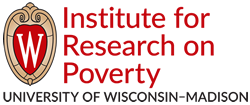IRP is a nonpartisan research institution dedicated to producing and disseminating rigorous evidence to inform policies and programs to combat poverty, inequality, and their effects in the United States. We do this through the orchestration of a national research, training, and dissemination agenda (see our resources and events pages) grounded in extensive collaboration among researchers, policymakers, and practitioners.
The Institute was created in 1966 with funding from the federal government to serve as a national center for the study of the nature, causes, and cures of poverty. We function as an independent, multidisciplinary center within the College of Letters and Science at the University of Wisconsin–Madison.
IRP’s ongoing success stems from our ability to:
- build, support, and develop a large and collaborative core of poverty scholars from multiple disciplines;
- produce and promote rigorous, diverse, and interdisciplinary poverty research;
- facilitate wide-ranging linkages to the policy and practice world; and
- distill, translate, and widely disseminate applied poverty and policy research.
Specifically, our integrated program of research, training, and dissemination effectively produces and applies research evidence to key policy questions and rigorously trains researchers in a variety of disciplines by leveraging IRP’s exceptional affiliates and research and administrative staff; our U.S. Collaborative of Poverty Centers (CPC) partner institutions; long-standing connections with researchers and research institutions in academia, government, and the nonprofit and for-profit sectors; and experience working collaboratively with policymakers, practitioners, and their membership organizations.

Mission
The Institute for Research on Poverty (IRP) advances the understanding of the causes and consequences of poverty and inequality by producing rigorous research, training scholars, engaging with policymakers and practitioners, and widely disseminating evidence.
Vision
Policies and practice are informed by evidence and lead to the reduction of poverty and inequality in the United States.
Make a Gift
Help IRP maintain its vigorous and productive community of poverty research scholars by making a gift to the Institute for Research on Poverty Fund or to the Robert J. Lampman Memorial Fund. You may contribute either online by following the secure links below, or by mail, to the address below. Help IRP maintain its vigorous…
IRP Statement of Commitment to Racial and Social Justice
The past year has been one of reckoning for the United States. While not new, the outrage over the murder of black citizens has made the systemic institutional violence and oppression people of color experience in their communities visible and demands that we all work toward change.
Land Statement
The University of Wisconsin–Madison, including the Institute for Research on Poverty, occupies ancestral lands of the Ho-Chunk Nation, People of the Sacred Voice, who have called this land Teejop (day-JOPE) since time immemorial. In an 1832 treaty, the Ho-Chunk people were forced to cede this territory. Decades of ethnic cleansing and extreme poverty followed when both the federal and state government repeatedly, but unsuccessfully, sought to forcibly remove the Ho-Chunk from Wisconsin. As part of a public, land-grant university, we respect the inherent sovereignty and unique legal status of the First Nations of Wisconsin as affirmed and set forth in state and federal law. For more information about the First Nations of Wisconsin, please visit their websites and wisconsinfirstnations.org.
IRP Demographic Data Privacy Policy
The Institute for Research on Poverty (IRP) supports rigorous multidisciplinary policy-relevant research on poverty and economic mobility that represents a range of perspectives. We do this through fellowship programs, grant programs, research, publications, and events.
Research Core
National Research Center on Poverty and Economic Mobility
The Institute for Research on Poverty (IRP) is currently engaged in a five-year (2016-2021), $9.5 million cooperative agreement with the Office of the Assistant Secretary for Planning and Evaluation (ASPE) in U.S. Department of Health and Human Services (HHS) to serve as the sole federally funded National Poverty Research Center in the United States. ASPE…
U.S. Collaborative of Poverty Centers (CPC)
CPC – Collaborative of Poverty Centers Logo As the National Poverty Research Center, the Institute for Research on Poverty (IRP) coordinates a formal network of university-based poverty centers known as the U.S. Collaborative of Poverty Centers (CPC) . The CPC was created because no single institution has the capacity to address the full range of issues…
Poverty - Research Affiliates
IRP has over 200 poverty research Affiliates comprising leading scholars in Economics, Sociology, Public Affairs, Public Health, Political Science, Law, Business, Social Work, and other disciplines, at UW–Madison and institutions across the nation. These scholars increase our understanding of the causes and consequences of poverty in America and establish an evidence-base for antipoverty public policies.
IRP Making a Difference Over 50 Years
Chancellor Rebecca M. Blank
In this essay I reflect on the accomplishments of the Institute for Research on Poverty, known as IRP, in the last half-century. This is personal for me. I have been an IRP Affiliate for many years and IRP played an important part in my intellectual training. But before reviewing how IRP has transformed our understanding of poverty...
